Obituary: Luciano Gattinoni

In Memory of Professor Luciano Gattinoni
It is with profound sadness that we announce the passing of Professor Luciano Gattinoni, a man of unparalleled intellect, insatiable curiosity, and boundless humanity. A true Renaissance man, he approached life with a deep love for science, art, music, and literature, leaving an indelible mark on all who had the privilege to know him.
Born on January 12, 1945, in Milan, Italy, Professor Gattinoni graduated in Medicine in 1969 from the University of Milan and specialised in Anaesthesia and Resuscitation in 1974. His early career included significant international experience as a research fellow at the NIH in Bethesda, USA, from 1975 to 1977. He later became a full professor at the University of Milan and served as Chief of Intensive Care at Ospedale Maggiore Policlinico.
Professor Gattinoni was a towering figure in intensive care medicine, profoundly shaping our understanding of ARDS and ECMO. Known as the “Father of Prone Positioning,” he revolutionised mechanical ventilation strategies with his pioneering “baby lung” concept, derived from groundbreaking CT scan analyses. His research laid the foundation for lung-protective ventilation strategies and extracorporeal CO2 removal, saving countless lives globally, particularly during the COVID-19 pandemic.
Beyond his scientific achievements, Professor Gattinoni was a man of extraordinary warmth, wisdom, and humour. His infectious laugh, remarkable sense of curiosity, and enthusiasm for life inspired all who crossed his path. His commitment to mentorship and education shaped generations of intensivists and researchers worldwide. Over his illustrious career, he authored more than 600 peer-reviewed articles and received numerous accolades, including the prestigious Ambrogino d’Oro from the City of Milan, honorary memberships in international societies, and Lifetime Achievement Awards from both European and American institutions. Professor Gattinoni served as President of the European Society of Intensive Care Medicine (ESICM) from 1988 to 1990.
His life was a symphony composed of brilliance, passion, and an unwavering dedication to improving lives. Professor Gattinoni’s legacy will continue to guide and inspire the field of intensive care medicine for generations to come.
Our deepest condolences go to his family, colleagues, and all whose lives he touched. His loss is deeply felt, but his contributions and spirit will forever resonate within the medical community and beyond.